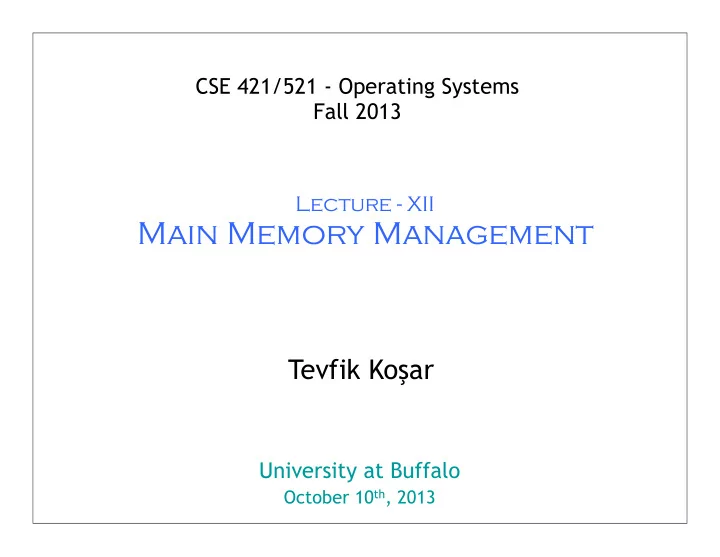

CSE 421/521 - Operating Systems Fall 2013 Lecture - XII Main Memory Management Tevfik Ko ş ar University at Buffalo October 10 th , 2013 1
Roadmap • Main Memory Management • Fixed and Dynamic Memory Allocation • External and Internal Fragmentation • Address Binding • HW Address Protection 2
Memory Management Requirements Ø The O/S must fit multiple processes in memory ü memory needs to be subdivided to accommodate multiple processes ü memory needs to be allocated to ensure a reasonable supply of ready processes so that the CPU is never idle ü memory management is an optimization task under constraints Fitting processes into memory is like fitting boxes into a fixed amount of space 3
Memory Allocation • Fixed-partition allocation – Divide memory into fixed-size partitions OS – Each partition contains exactly one process process 5 – The degree of multi programming is bound by process 9 the number of partitions process 10 – When a process terminates, the partition becomes available for other processes process 2 è no longer in use 28
Memory Allocation (Cont.) • Variable-partition Scheme (Dynamic) – When a process arrives, search for a hole large enough for this process – Hole – block of available memory; holes of various size are scattered throughout memory – Allocate only as much memory as needed – Operating system maintains information about: a) allocated partitions b) free partitions (hole) OS OS OS process 5 process 5 process 5 process 9 process 9 process 10 process 2 process 2 process 2 29
Fragmentation • External Fragmentation – total memory space exists to satisfy a request, but it is not contiguous (in average ~50% lost) • Internal Fragmentation – allocated memory may be slightly larger than requested memory; this size difference is memory internal to a partition, but not being used • Reduce external fragmentation by compaction – Shuffle memory contents to place all free memory together in one large block – Compaction is possible only if relocation is dynamic, and is done at execution time 32
Dynamic Storage-Allocation Problem How to satisfy a request of size n from a list of free holes • First-fit : Allocate the first hole that is big enough • Best-fit : Allocate the smallest hole that is big enough; must search entire list, unless ordered by size. Produces the smallest leftover hole. • Worst-fit : Allocate the largest hole; must also search entire list. Produces the largest leftover hole. First-fit is faster. Best-fit is better in terms of storage utilization. Worst-fit may lead less fragmentation. 30
Example 8
Address Binding • Addresses in a source program are generally symbolic – eg. int count; • A compiler binds these symbolic addresses to relocatable addresses – eg. 100 bytes from the beginning of this module • The linkage editor or loader will in turn bind the relocatable addresses to absolute addresses – eg. 74014 • Each binding is mapping from one address space to another 9
Logical Address Space • Each process has a separate memory space • Two registers provide address protection between processes: • Base register: smallest legal address space • Limit register: size of the legal range 10
Memory-Management Unit ( MMU ) • Hardware device that maps logical to physical address • In MMU scheme, the value in the relocation register (base register) is added to every address generated by a user process at the time it is sent to memory • The user program deals with logical addresses; it never sees the real physical addresses 11
HW Address Protection • CPU hardware compares every address generated in user mode with the registers • Any attempt to access other processes’ memory will be trapped and cause a fatal error 12
Summary • Main Memory Management Hmm. • Memory Allocation . • Fragmentation • Address Binding • HW Address Protection 13
Acknowledgements • “Operating Systems Concepts” book and supplementary material by A. Silberschatz, P . Galvin and G. Gagne • “Operating Systems: Internals and Design Principles” book and supplementary material by W. Stallings • “Modern Operating Systems” book and supplementary material by A. Tanenbaum • R. Doursat and M. Yuksel from UNR 14
Recommend
More recommend